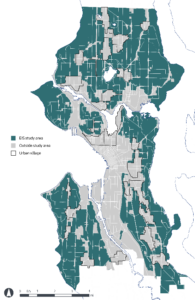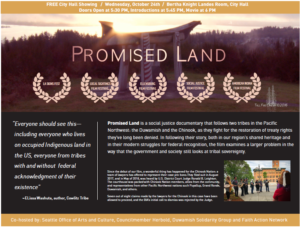District 1’s Young’s Restaurant and RainWise
I was delighted to learn recently that a beloved District 1 business, Young’s Restaurant, became the first commercial site to complete the RainWise program! If you’re unfamiliar with the RainWise program, it’s a Seattle Public Utility (SPU) lead effort to install rain gardens or cisterns to better manage rain. Rain that falls onto our roofs, driveways and roads most often runs into ditches and pipes. However, the runoff can carry harmful chemicals such as oil, metals, and lawn chemicals. Rain gardens on the other hand can hold and soak up this runoff and filter out the chemicals and cisterns can hold and better direct the water so that it doesn’t flow into and contaminate our waterways. The RainWise program offers a rebate where homeowners and businesses can apply for, and if they qualify, potentially pay for all the instillation costs. I hope other businesses will follow the example of Young’s Restaurant in being good environmental stewards by contacting SPU to see if installing a RainGarden is possible!
Last week NW Asian Weekly covered the story about Young’s Restaurant. If you’re interested in seeing if you’re eligible for the RainWise program, please go here.
This Week’s Budget Update
This week the Budget Committee met, beginning the stage of Council budget deliberations referred to as “Issue Identification,” where Council Central Staff presents highlights of department budgets and issues for potential changes that the Council might want to consider, as well as issues and proposals identified by Councilmembers themselves.
The highlights of Thursday’s Identification presentations can be found here:
Seattle Department of Construction and Inspections (SDCI) – you can see at the link that my top budget objective for SDCI is to enhance the Vacant Building Monitoring Program, which I’ve written about here and here because of the problems we have in District 1 with vacant, abandoned buildings.
Seattle Police Department (SPD) – The budget proposes funding sufficient to hire 10 new patrol positions in 2019 and 30 in 2020. In order to successfully meet that goal, the city will have to hire 104 new officers both years, to also fill the positions of officers that retire, get promoted to non-patrol positions, or make a lateral transfer. For this reason, we spent a lot of time in this budget discussion talking about recruitment incentives. We have generous lateral hire incentives, but we have no new hire financial incentives.
We also talked about the plan and funding necessary to reinstate the Community Service Officer program and the need to address the City Auditor’s 2017 Report on SPD special events staffing because SPD’s cost for staffing events exceed the fees we receive from promoters of special events.
Seattle Fire Department (SFD) – SFD reports that 40% of SFD’s medical responses serve “low acuity calls,” which can include alcohol- related issues and mental health issues, as well as less severe injuries for which the appropriate treatment is something other than a hospital emergency room. We spent time during this presentation talking about an alternative response model to reduce non-emergency 9-1-1 calls by working directly with service agencies and individuals in high-use areas to better align needs with appropriate health or social service agencies.
Next week Issue Identification is planned to continue through Wednesday. The tentative schedule includes for Monday: Sweetened Beverage Tax Funds; Tuesday: Homeless Services, Human Services, and the proposed Office of Employee Ombud; Wednesday: Parks and Recreation, SDOT, and cross-cutting issues and other departments with fewer identified issues.
Confirmation of meetings and agenda items can be found at the Budget Committee meeting schedule. You can also sign up to receive the agendas in advance by e-mail here.
The second budget public hearing is planned for 5:30 p.m. on Tuesday the 23rd. It will be in the Council Chambers on the second floor of City Hall at 600 4th Avenue. A separate hearing will also be held on the proposed expansion of the Seattle Aquarium.
Information on accessing City Hall, accommodations, a discounted parking rate, and childcare is available on the public hearing notice.
Here’s a link to the Budget calendar and background on the budget process.
Accessory Dwelling Unit Environmental Impact Statement and Racial Equity Toolkit
The Final Accessory Dwelling Unit (ADU) Environmental Impact Statement (EIS) was released on October 4, 2018. The ADU EIS evaluates the potential environmental impacts of proposed changes to the Land Use Code related to the creation of accessory dwelling units in single-family zones.
There are two kinds of accessory dwelling units, attached and detached ADUs (DADUs). Attached ADUs are often referred to as an in-law unit or basement apartments and are contained within or attached to a single-family home. A detached ADU is sometimes called a backyard cottage and is a separate structure contained in a single-family lot. The final EIS contains a Preferred Alternative that contains elements of two alternatives evaluated in the draft EIS and is reflective of input received during the draft EIS comment period.
The key features of the Preferred Alternative include:
- Allowing two ADUs on one lot
- Removing the off-street parking requirement
- Allowing DADUs on lots of at least 3,200 square feet
- Removing the owner-occupancy requirement
- Requiring one year of continuous ownership before establishing a second ADU
- Allowing DADUs of up to 1,000 square feet, the same size currently allowed for ADUs
- Increasing DADU height limits by 1-2 feet, to allow flexibility for green building strategies
- Providing flexibility for one-story DADUs accessible to people with disabilities or limited mobility, with limitations on tree removal
- Establishing a new floor area ratio (FAR) standard that limits the maximum size of new mega-size single-family homes

On Friday October 12, 2018 there was a special meeting of the Sustainability and Transportation Committee to discuss the ADU Racial Equity Toolkit (RET). The Racial Equity Toolkit is a framework provided by the City’s Race and Social Justice Initiative. It lays out a process to evaluate the racial justice impacts of city policies, initiatives, and programs. As part of evaluating the impacts of potential ADU legislation Councilmember O’Brien’s office helped to conduct a Racial Equity Toolkit on this issue.
One of the key RET findings was that “the benefits associated with increasing the rental housing stock through the creation of ADUs will disproportionately be accrued by wealthy, primarily white, households.” This is because, not only is this demographic more likely to own their home but also because “due to the high cost of construction, ADUs are still typically priced above what households with lower-incomes and households of color can afford.”
But removing some of the regulatory barriers in the Land Use Code could help increase the number and variety of housing choices in single family zones and could positively impact affordability and decrease displacement by decreasing the teardown of existing single-family homes.
The RET also highlighted the limits of land code changes to fully mitigate generations of redlining and unequitable planning and housing policies. The RET explored several different strategies for reducing the cost and barriers to building ADUs including financing support, reducing construction costs and pre-approved Detached Accessory Dwelling Unit plans. You can read the entire ADU RET report here and watch the committee discussion here.
Following the Council’s passage of the 2019-2020 Budget (late November), Councilmember O’Brien will lead the development of legislation which will be informed by additional public comment opportunities.
This week, the City Council got notice that an appeal to the Final EIS was filed with the Hearing Examiner. This appeal adds a layer of uncertainty to the timing. You can follow this issue on the City’s ADU webpage here or you can email the project team at ADUEIS@seattle.gov.
Promised Land Movie Showing at City Hall, Wednesday 10/24
On Wednesday, October 24th I’ll be co-hosting with the Office of Arts and Culture, the Faith Action Network, and Real Rent Duwamish a showing of the movie Promised Land in City Hall, in the Bertha Knight Landes Room on the main floor of City Hall. Doors open at 5:30 p.m., a welcome is at 5:45, and the movie showing at 6 p.m. Admission is free, and so is the popcorn!
Promised Land is an award-winning documentary about the fight for two tribes in the Pacific Northwest, the Duwamish and the Chinook, as they fight for the restoration of treaty rights they’ve long been denied. In following their story, the film examines a larger problem in the way that the government and society still looks at tribal sovereignty.
From the Promised Land website:
“Indigenous recognition is at the frontline of the battle for native sovereignty. These tribes—who signed treaties, helped settlers, and lost their land—are asking for their treaties to be honored. To redefine their recognition, to put blood quantum restrictions on who is and isn’t native enough, to redefine treaties over and over, continues a toxic cycle of colonialism where the government, and the corporations it partners with, continues to unlawfully profit off of the resources of indigenous lands at great peril to our increasingly climate-challenged world.”
We’ll be joined by filmmakers Sarah Salcedo and Vasant Salcedo, and Cecile Hansen, Chair of the Duwamish Tribe.
More information about the movie is available at the Promised Land website. More information is available at the Facebook event page.
Wednesday, October 24th
Door: 5:30 p.m.
Welcome: 5:45
Movie: 6 p.m.

Comment on Technologies Subject to the City’s Surveillance Ordinance
The City is holding a series of public meetings to ask the public for comment on the first six of 29 technologies that meet the City’s definition of surveillance as defined in this ordinance.
This recent article about GrayKey, a technology that, reportedly, the Seattle Police Department is in the process of acquiring, explains why privacy rights advocate believe that the Surveillance Ordinance is so important.
Please go here to learn more about which technologies are currently under review, and to get a one-page summary of each technology.
On Thursday, October 25th the City will be taking public comment at the American Legion Post 160 of West Seattle (3618 SW Alaska St).
You may provide comments in three ways:
- attendance at any of the meetings listed below
- mail comments to Attn: Surveillance & Privacy Program, Seattle IT, PO Box 94709, Seattle, WA 98124
- submit a comment online at gov/privacy.
Public Meetings
Please contact Surveillance@seattle.gov if you require any language or other accommodations.
In-District Office Hours
On October 26, I will be at the Southwest Customer Service Centers (2801 SW Thistle St) from 2:00 p.m. – 6:45 p.m. The final meeting of the day will begin at 6:30 p.m.
These hours are walk-in friendly, however, appointments that have been made in advance will have priority. To schedule an appointment, please contact my scheduler Alex Clardy (alex.clardy@seattle.gov).
Additionally, my last tentatively scheduled office hours for this year are: Friday, December 14, 2018 at the South Park Community Center (8319 8th Avenue S).

